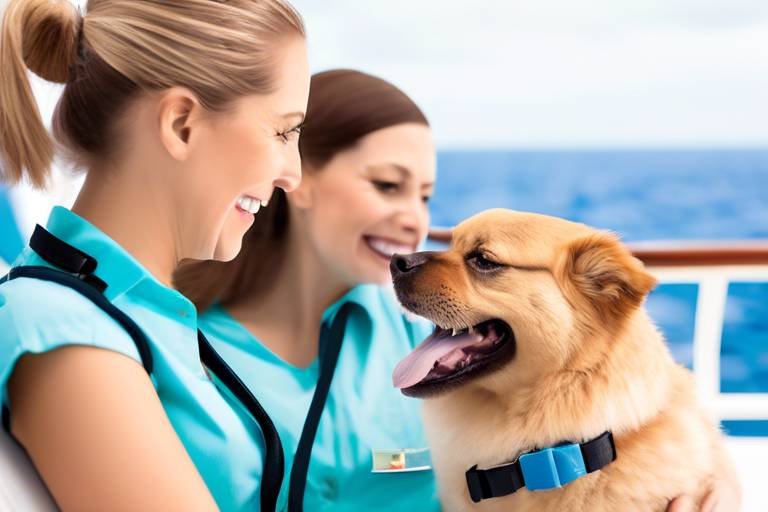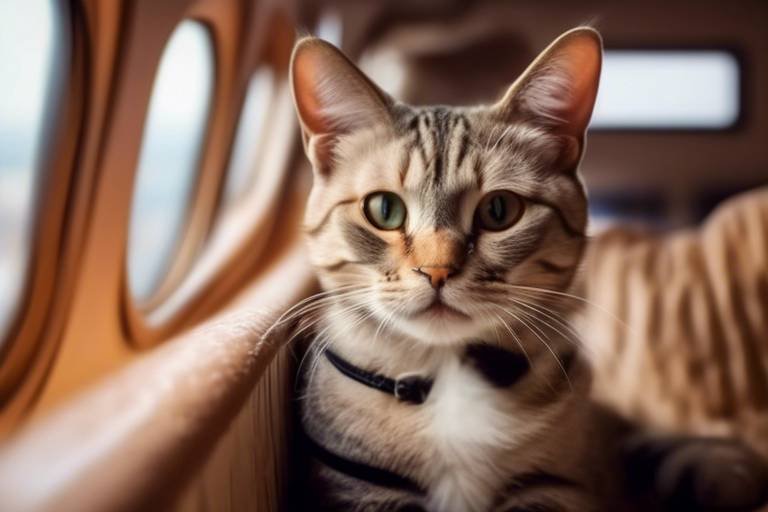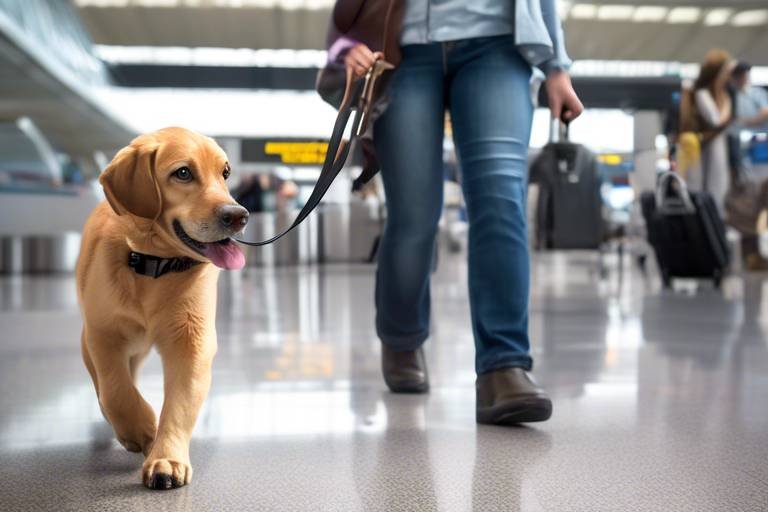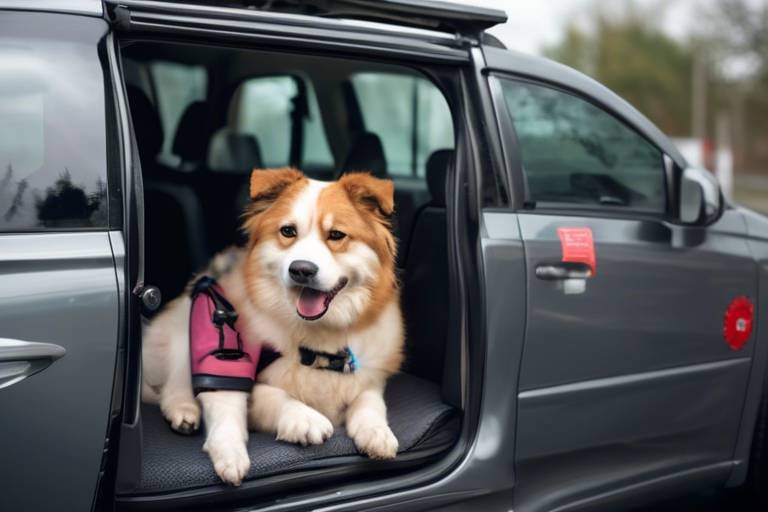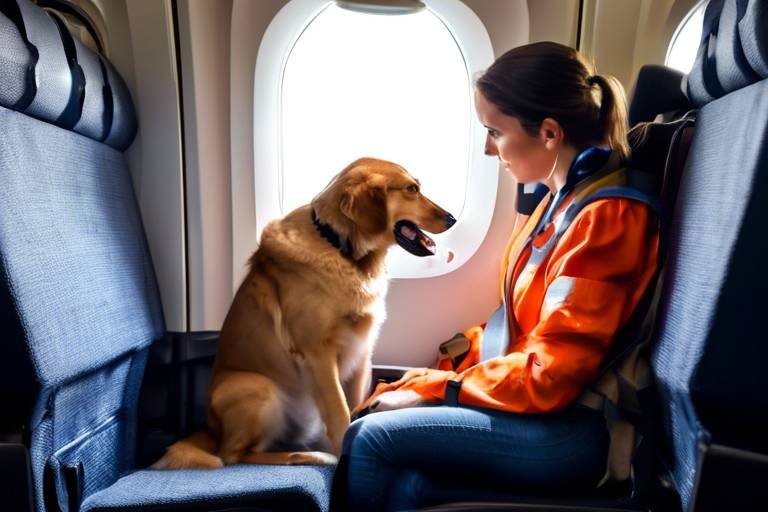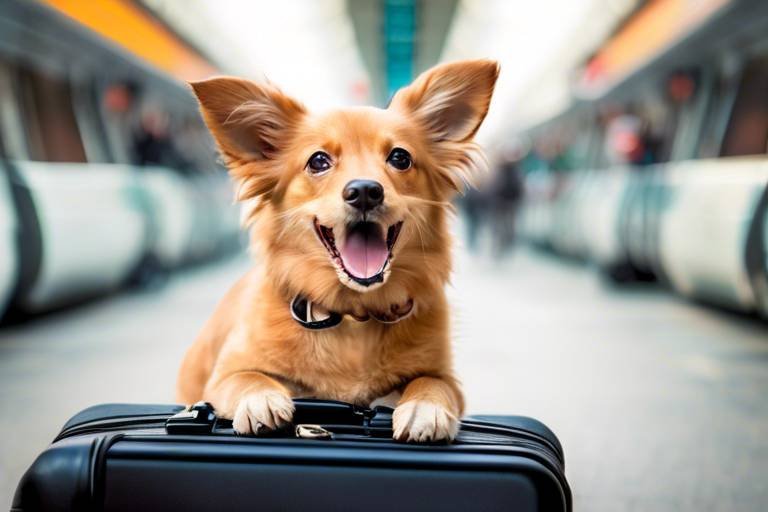How to Manage Pet Care While on a Cruise
Planning a cruise can be an exciting adventure, but it often comes with the challenge of ensuring your beloved pets are well taken care of while you're away. After all, you wouldn't want to enjoy your vacation with a nagging worry about your furry friends, right? The good news is that with a bit of preparation and the right resources, you can set your pets up for a comfortable and safe experience while you sail the seas. In this article, we’ll dive into effective strategies for managing pet care while you enjoy your cruise, including preparation steps, pet-sitting options, and tips for a smooth transition.
Preparation is key to ensuring your pet remains comfortable and safe while you’re away. Start by scheduling a visit to the veterinarian to ensure your pet is up-to-date on vaccinations and health checks. This is particularly important if your pet has any pre-existing conditions. Just like you wouldn't embark on a cruise without checking your travel documents, your pet deserves the same level of care. Additionally, consider acclimatization techniques, such as short separations from your pet leading up to your trip, to help them adjust to your absence.
Selecting a reliable pet-sitting service is crucial for your pet's well-being. You want to ensure that your pet is in good hands while you're off enjoying the ocean breeze. Start by evaluating potential sitters. Check their references and ask about their experience with different types of pets. A good pet sitter should not only be trustworthy but also someone who understands your pet's unique personality and needs. After all, your pet is not just an animal; they are a part of your family!
In-home pet care can provide a familiar environment for your pet, which can significantly reduce their stress levels. Imagine how comforting it would be for your pet to stay in their own home rather than being placed in an unfamiliar environment. This option allows them to maintain their routine, which is crucial for their emotional well-being. An in-home pet sitter can provide companionship, exercise, and even grooming, all while keeping your pet's environment consistent.
Finding local pet sitters can be made easier through online platforms and community recommendations. Websites like Rover or Care.com can connect you with trustworthy sitters in your area. Additionally, don’t underestimate the power of word-of-mouth. Ask friends, family, or even your veterinarian for recommendations. A personal referral can often lead you to the perfect sitter who has already been vetted by someone you trust.
Interviewing potential sitters is essential to ensure they align with your pet's needs. Prepare a list of questions that cover their experience, availability, and approach to handling pets. For example, ask them about their experience with your specific breed and how they handle emergencies. A good pet sitter should be able to provide you with peace of mind, so trust your instincts during the interview process. If something feels off, keep looking!
Boarding facilities can be a good option for pet care while cruising, but they come with their own set of pros and cons. On one hand, boarding facilities offer socialization opportunities for your pet, which can be beneficial if they enjoy the company of other animals. On the other hand, the change in environment can be stressful for some pets. It’s essential to weigh these options carefully and consider your pet’s personality before making a decision.
Establishing a care schedule helps ensure your pet's needs are met consistently. Create a detailed care plan that includes feeding times, exercise routines, and any medication your pet may need. This schedule should be shared with your pet sitter to keep everything on track. A well-structured plan can help your pet feel more secure and less anxious while you're away.
Effective communication with your pet sitter is vital for your pet's care. Provide clear instructions and encourage your sitter to reach out with any questions or concerns. Keeping in touch throughout your cruise can provide you with peace of mind, allowing you to enjoy your vacation without worrying about your pet. Consider setting up daily check-ins via text or video call to see how your furry friend is doing.
Preparing for emergencies is essential when leaving your pet. Compile a list of emergency contacts, including your veterinarian's phone number, local animal hospitals, and any friends or family who can step in if needed. Ensure your sitter has this information readily available. Additionally, provide clear instructions on what to do in case of an emergency, so your sitter feels equipped to handle unexpected situations.
- What should I look for in a pet sitter? Look for experience, references, and a genuine love for animals.
- How can I reduce my pet's anxiety while I'm away? Maintain their routine and consider leaving behind familiar items like toys or blankets.
- Is in-home care better than boarding? It depends on your pet's personality; some pets thrive in familiar environments, while others enjoy socializing.
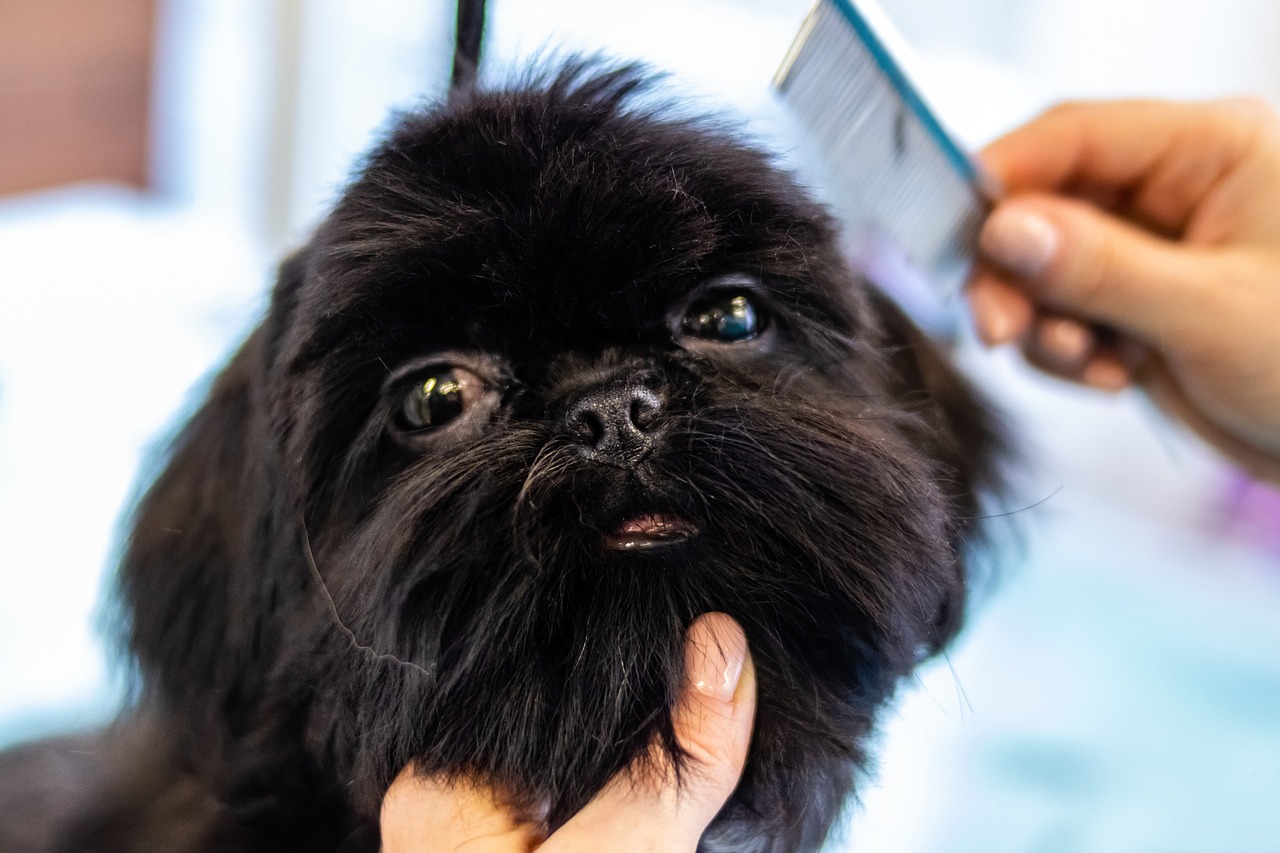
Preparing Your Pet for a Cruise
When it comes to preparing your furry friend for your upcoming cruise, preparation is absolutely crucial. Just like you would pack your bags and plan your itinerary, your pet also needs a little TLC to ensure they remain comfortable and safe while you're away. Start by scheduling a visit to the vet to make sure your pet is in tip-top shape. This includes checking their vaccinations, as some places may require specific shots before boarding. You wouldn’t want your pet to miss out on fun just because they’re not up-to-date on their vaccinations!
Moreover, consider an overall health check. Is your pet showing any signs of illness or discomfort? Addressing these issues beforehand can save you a lot of worry later. Just imagine leaving for a week-long adventure only to get a call from your pet sitter about your pet feeling unwell. Yikes! To avoid this, make sure your pet is healthy enough to maintain their routine in your absence.
Another important step is acclimatization. If your pet isn’t used to being away from you or their home, they might experience anxiety. To help them adjust, try to simulate the experience of being away. You could start by leaving them with a friend or a family member for a few hours at a time. This way, they can get accustomed to being cared for by someone else while you’re not around. It’s like a mini-vacation for them, too!
Additionally, gathering their favorite toys and blankets can provide comfort. Just think of it as packing their own little suitcase! Familiar smells and textures can significantly reduce stress levels. You might also want to consider using a calming product, like a pheromone spray or a cozy bed that smells like you. The goal is to create a safe and inviting space for your pet, so they feel secure even when you’re not there.
Finally, don't forget to prepare a detailed care guide for your pet sitter. This should include feeding schedules, favorite activities, and any quirks your pet may have. For example, if your dog loves to chase after a specific toy or if your cat prefers to hide under the bed during thunderstorms, make sure to share these insights with your sitter. The more information they have, the better they can care for your pet!
In summary, preparing your pet for a cruise involves a combination of health checks, acclimatization, and thoughtful planning. By putting in the effort now, you can enjoy your vacation knowing that your beloved pet is well taken care of. So, pack your bags, and don’t forget to include a little love for your furry friend!

Choosing the Right Pet-Sitting Service
When it comes to ensuring your furry friend is well taken care of while you’re off enjoying the open seas, choosing the right pet-sitting service is absolutely crucial. After all, your pet is more than just an animal; they’re a beloved member of your family. So, how do you find someone who will treat them with the same love and care that you do? First off, start by evaluating potential sitters. This means doing a little homework—checking references, reading reviews, and, if possible, meeting them in person. You wouldn’t let just anyone babysit your kids, right? The same principle applies here!
Next, you need to understand the sitter's experience with different pets. Not all sitters are created equal. Some may have a wealth of experience with dogs but little to none with cats, birds, or other exotic pets. Make sure to ask them about their background, and don’t hesitate to inquire about specific situations they’ve handled. You want to ensure they can manage any quirks your pet may have, like a cat that loves to hide or a dog that gets anxious during thunderstorms.
Another important factor is to consider the services they offer. Some sitters might provide just basic feeding and walking, while others might offer a full suite of services, including playtime, grooming, and even administering medication. Create a checklist of your pet’s needs and see how well the sitter aligns with them. If your pet requires special attention or has specific health needs, make sure the sitter is equipped to handle those situations. It’s all about finding that perfect match!
To help you evaluate potential sitters, consider creating a comparison table like the one below:
| Criteria | Pet Sitter A | Pet Sitter B | Pet Sitter C |
|---|---|---|---|
| Experience with Dogs | 5 years | 2 years | 10 years |
| Experience with Cats | 3 years | 5 years | 0 years |
| Services Offered | Walking, Feeding | Walking, Feeding, Grooming | Feeding, Medication, Playtime |
| References Available | Yes | No | Yes |
Once you’ve narrowed down your options, it’s time for the interview. This is your opportunity to gauge their personality and see if they’re a good fit for your pet. Ask questions like:
- What would you do in case of an emergency?
- How do you handle pets with special needs?
- Can you provide updates while I’m away?
Remember, you want someone who not only has the skills but also the right temperament. A calm and patient person will likely be a better fit for a nervous pet than someone who is high-energy and excitable. Trust your instincts—if something feels off, it’s okay to keep looking!
In conclusion, finding the right pet-sitting service is about more than just convenience; it’s about peace of mind. By thoroughly evaluating potential sitters, understanding their experience, and ensuring they meet your pet’s specific needs, you can set sail on your cruise knowing your furry friend is in good hands.
In-Home Pet Care Options
When it comes to ensuring your furry friend feels comfortable while you’re off sailing the high seas, in-home pet care options can be a game changer. Imagine your pet lounging in their own familiar space, surrounded by their favorite toys and the comforting scent of home, rather than being stressed out in a new environment. This is exactly what in-home pet care offers: a chance for your pet to maintain their routine and feel safe while you enjoy your cruise.
One of the biggest advantages of in-home pet care is the reduced stress factor. Pets are creatures of habit, and a sudden change in their environment can lead to anxiety. By keeping your pet at home, they can continue their daily rituals—like napping in their favorite sunny spot or playing with their beloved squeaky toy. Plus, they have the added comfort of their own bed, which can make a world of difference in their emotional well-being.
Another benefit is the opportunity for personalized care. A professional pet sitter can cater to your pet's specific needs, whether it’s administering medication, sticking to a particular feeding schedule, or ensuring they get their daily walks. This level of tailored attention can help your pet feel more secure and loved, even in your absence. In fact, many pet sitters will take the time to learn your pet's quirks and preferences, making them feel as though they’re still receiving the same level of care as when you're home.
In-home pet care also allows for social interaction. While you're away, your pet can enjoy the company of a sitter who can engage them in play or simply provide companionship. This can be especially beneficial for pets that may become lonely or bored when left alone for extended periods. A good pet sitter will not only feed and walk your pet but will also spend quality time with them, keeping their spirits high.
Of course, it’s important to find a reliable pet sitter who can deliver all these benefits. When searching for the right fit, consider the following:
- Experience with your specific breed
- References from previous clients
- Availability during your trip
- Understanding of your pet's unique needs
In summary, in-home pet care options can provide a seamless transition for your pet while you enjoy your cruise. By keeping them in a familiar environment with a trusted sitter, you can set sail with peace of mind, knowing that your furry friend is in good hands. It’s all about finding the right balance between adventure for you and comfort for your pet.
Q: How do I find a reliable in-home pet sitter?
A: Start by asking for recommendations from friends or family. You can also check online platforms that specialize in pet care services, where you can read reviews and check credentials.
Q: What should I prepare for the pet sitter?
A: Create a detailed care plan that includes feeding instructions, exercise routines, emergency contacts, and any special needs your pet may have.
Q: How can I ensure my pet is comfortable with the sitter?
A: Arrange a meet-and-greet before your trip. This allows your pet to get to know the sitter and helps you assess their compatibility.
Q: What if my pet has special medical needs?
A: Be sure to communicate any medical requirements clearly to the sitter and provide any necessary medications along with detailed instructions.
Finding Local Pet Sitters
When it comes to ensuring your furry friend is in good hands, finding a local pet sitter can feel like searching for a needle in a haystack. But don't worry! With a bit of guidance and the right approach, you can discover a reliable pet sitter who will treat your pet like family. Start by tapping into your community. Word-of-mouth recommendations from friends, family, or even fellow pet owners at the local park can be invaluable. People who have had positive experiences will be more than happy to share their insights.
Another great resource is online platforms dedicated to pet care services. Websites like Rover and Care.com allow you to browse through profiles of local pet sitters, complete with reviews and ratings from previous clients. This can give you a clearer picture of what to expect. When using these platforms, be sure to filter your search based on your pet's specific needs, whether it's a sitter who specializes in dogs, cats, or even exotic pets.
Before making a decision, it’s wise to check out local community boards, both online and offline. Many neighborhoods have Facebook groups or Nextdoor communities where residents share recommendations for services, including pet care. You can post a question asking for suggestions, and you might be surprised by the wealth of information that comes your way!
Once you've gathered a list of potential sitters, consider reaching out to them for a meet-and-greet. This initial interaction is crucial, as it allows you to observe how they interact with your pet. Pay attention to your pet's reaction as well; if they seem comfortable and happy, that's a great sign! Additionally, during this meeting, you can ask about their experience, qualifications, and approach to pet care. Here are some key questions to consider:
- What is your experience with my type of pet?
- How do you handle emergencies?
- Can you provide references from previous clients?
- What is your policy on cancellations or changes?
Remember, finding the right pet sitter is not just about convenience; it’s about ensuring your pet feels safe and loved while you're away. So take your time, do your research, and trust your instincts. Your pet deserves the best!
- How do I know if a pet sitter is trustworthy?
Check reviews, ask for references, and meet them in person before making a decision. - What should I prepare before leaving my pet with a sitter?
Provide detailed instructions about feeding, exercise, and any special needs your pet may have. - Can I contact my pet sitter while I'm away?
Absolutely! Good communication is key, so establish a way to stay in touch. - What if my pet has an emergency while I'm away?
Ensure your sitter has a list of emergency contacts and your vet's information.
Interviewing Potential Sitters
When it comes to interviewing potential pet sitters, the process can feel a bit daunting, but it’s crucial for ensuring your furry friend receives the best care possible while you’re off enjoying your cruise. You wouldn’t just hand over the keys to your house without a second thought, right? The same goes for your beloved pet! Start by creating a comfortable atmosphere for the interview. This will help both you and the sitter feel at ease, allowing for a more genuine conversation.
Begin with the basics: ask about their experience with pets similar to yours. Not all pets are created equal, and understanding their background can give you peace of mind. For instance, if you have a high-energy dog, you’ll want to know if the sitter has experience managing such breeds. Ask questions like:
- How many years have you been pet sitting?
- What types of pets have you cared for in the past?
- Can you provide references from previous clients?
Next, delve into their approach to pet care. You might want to know how they handle situations like unexpected illnesses or behavioral issues. A good sitter should have a plan in place for emergencies, and it’s worth discussing their strategies. For example, you could ask:
- What would you do if my pet got sick?
- How do you handle aggressive behavior in pets?
Another important aspect is to gauge their personality and compatibility with your pet. You can do this by observing how they interact with your pet during the interview. A genuine connection can make a world of difference in your pet’s comfort level. Pay attention to their body language and response to your pet's behavior. It’s like finding a new friend for your furry companion!
Finally, don’t forget to discuss logistics. Clarify their availability, the number of visits per day, and how they plan to keep you updated while you’re away. Regular updates can ease your mind, so ask if they’re comfortable sending photos or texts during their visits. This way, you can enjoy your cruise knowing your pet is in good hands. A well-thought-out interview can help you feel confident in your choice, ensuring that your pet receives the love and attention they deserve while you’re sailing the seas.
Q1: How do I know if a pet sitter is trustworthy?
A1: Look for sitters with positive reviews, ask for references, and trust your instincts during the interview process.
Q2: Should I provide my pet sitter with a list of instructions?
A2: Absolutely! Providing a detailed care plan ensures your pet’s needs are met and helps the sitter feel more prepared.
Q3: How can I keep in touch with my pet sitter while I'm away?
A3: Discuss your preferred method of communication beforehand, whether it be text, email, or phone calls, to receive updates on your pet.
Q4: What should I do if my pet has special needs?
A4: Be upfront about any special requirements during the interview, and ensure the sitter has experience handling those needs.
Boarding Facilities: Pros and Cons
When it comes to ensuring your furry friend is well-cared for while you’re off enjoying the high seas, boarding facilities can be an appealing option. However, like any choice, there are both pros and cons to consider. On one hand, boarding facilities can provide a structured environment where your pet is supervised by trained professionals. This can be especially beneficial if your pet requires special care or medication. Additionally, many facilities offer socialization opportunities, allowing your pet to interact with other animals, which can be great for their mental stimulation.
However, it’s essential to recognize that boarding can also introduce stress for some pets. The change in environment, the sounds of other animals, and the absence of their favorite human can lead to anxiety. For pets that thrive on routine, the disruption of their daily habits can be particularly challenging. It’s crucial to assess your pet's personality and comfort level with new situations before making a decision.
To help you weigh your options, here’s a quick overview of the pros and cons of using boarding facilities:
| Pros | Cons |
|---|---|
|
|
Ultimately, the decision to use a boarding facility should be based on your pet’s individual needs and personality. If your pet is social and adaptable, a boarding facility might be a perfect fit. However, if they’re more of a homebody or have specific care requirements, exploring in-home pet care options might be the better route. Remember, the goal is to ensure your pet feels safe and loved, even when you’re not around!
1. What should I look for in a boarding facility?
When choosing a boarding facility, consider factors like cleanliness, staff qualifications, and the overall environment. It’s also wise to read reviews and possibly visit the facility beforehand.
2. How can I prepare my pet for boarding?
To prepare your pet, try to acclimate them to the facility by visiting for short periods. Bring their favorite toys or blankets to help them feel more at home.
3. Are there any alternatives to boarding facilities?
Yes! In-home pet care, where a sitter comes to your home, can be a great alternative. It allows your pet to stay in their familiar environment.
4. What if my pet has special needs?
Make sure to communicate any special requirements to the boarding facility or pet sitter. Many facilities are equipped to handle pets with specific needs, but it’s essential to check beforehand.

Creating a Care Schedule
When it comes to ensuring your pet is well taken care of while you're off on a cruise, is absolutely essential. Think of it as a roadmap for your pet sitter; it outlines everything your furry friend needs to thrive in your absence. A well-structured schedule not only helps your pet maintain their routine but also gives you peace of mind, knowing that their needs are being met consistently.
Start by detailing your pet's daily routine. This includes their feeding times, exercise needs, and any special care instructions. For instance, if your dog typically eats at 8 AM and 6 PM, make sure to specify this. You might also want to include information about their favorite toys or games, which can help keep them entertained and engaged. Here's a simple example of what your care schedule might look like:
| Time | Activity | Notes |
|---|---|---|
| 8:00 AM | Feeding | 2 cups of dry food |
| 9:00 AM | Walk | 30-minute walk around the neighborhood |
| 12:00 PM | Playtime | Fetch with the red ball |
| 6:00 PM | Feeding | 2 cups of dry food |
| 8:00 PM | Evening walk | 15-minute walk before bed |
In addition to outlining daily activities, consider including any specific instructions for medication administration if your pet requires it. This could be as simple as stating the dosage and timing, or it might involve more detailed instructions if your pet needs a special method of taking their meds.
Another important aspect of your care schedule is to include emergency contacts. This should list your veterinarian's contact information, as well as a nearby emergency animal clinic. If something unexpected happens, your pet sitter will appreciate having this information readily available. You might also want to include your contact information, in case your sitter needs to reach you while you're sailing the seas.
Lastly, don’t forget to communicate with your pet sitter about any behavioral quirks or preferences your pet may have. For example, if your cat prefers to eat in a quiet space away from noise, make sure to note that. This small detail can make a big difference in how comfortable your pet feels during your absence.
By taking the time to create a thorough care schedule, you’re not just ensuring your pet will be well cared for, but you’re also setting your pet sitter up for success. After all, a happy pet sitter makes for a happy pet!
- How detailed should my care schedule be? The more detailed, the better! Include everything from feeding times to favorite toys.
- What if my pet has special needs? Be sure to include any special instructions in the care schedule, especially for medications.
- Can I change the schedule after I leave? Yes, but make sure to communicate any changes to your sitter promptly.
Communicating with Your Pet Sitter
When you're off enjoying the sun and sea, the last thing you want to worry about is whether your furry friend is being taken care of. That’s why effective communication with your pet sitter is absolutely essential. Think of your pet sitter as your eyes and ears back home, ensuring your pet is safe, happy, and healthy while you’re away. To achieve this, you need to set the stage for open dialogue before you even leave for your cruise.
Start by providing your pet sitter with a comprehensive care guide. This guide should include all the important details about your pet’s routine, preferences, and any quirks. For instance, does your dog prefer to eat at a certain time? Is your cat skittish around strangers? The more information you provide, the better equipped your sitter will be to take care of your pet. Consider including the following in your care guide:
- Feeding Schedule: Specify what and when to feed your pet, including any special dietary needs.
- Exercise Routine: Detail the types of activities your pet enjoys, like walks or playtime.
- Health Information: Note any medications your pet needs, along with dosages and administration times.
- Emergency Contacts: Provide your veterinarian's contact information and any other emergency contacts.
Next, it’s important to establish a communication plan. Decide how often you would like to receive updates during your trip. Some pet owners prefer daily check-ins, while others might be fine with a few updates throughout the week. Make sure your sitter knows your preferences, and don't hesitate to ask for photos or videos of your pet to ease your mind. After all, seeing your pet happy and healthy can be the best remedy for homesickness!
Additionally, consider using a shared app or platform for communication. Apps like WhatsApp or even a simple email thread can be great for keeping everything organized. You can create a shared document that your sitter can update with notes, photos, and any questions they might have. This not only keeps you informed but also provides a written record of your pet's care.
Lastly, don’t forget to encourage your pet sitter to reach out if they have any questions or concerns. Whether it’s a sudden change in behavior or a minor health issue, it’s better to communicate than to guess. Assure them that they can contact you at any time, and provide them with your preferred method of communication. This open line of communication will not only help your sitter feel more confident but will also give you peace of mind while you’re away.
Q: How often should I communicate with my pet sitter?
A: It depends on your preference, but many pet owners opt for daily updates or every few days. Just ensure you discuss this with your sitter beforehand.
Q: What information should I include in my pet care guide?
A: Include feeding schedules, exercise routines, health information, and emergency contacts. The more detail, the better!
Q: Can I request photos of my pet?
A: Absolutely! Most pet sitters are happy to send updates and photos to reassure you that your pet is doing well.
Q: What should I do if my pet has special needs?
A: Make sure to highlight any special needs in your care guide and discuss them with your sitter to ensure they’re fully prepared.
Emergency Contacts and Instructions
Leaving your beloved pet behind while you embark on a cruise can be nerve-wracking, but being prepared for emergencies can ease your mind significantly. First and foremost, it's crucial to compile a list of emergency contacts that your pet sitter can reach out to in case of any unforeseen situations. This list should include your veterinarian's contact information, as well as an alternative vet clinic nearby, just in case your usual vet isn't available. Additionally, consider including the contact details of a trusted friend or family member who can step in if needed.
When creating your emergency instructions, be thorough and clear. Start by detailing your pet's medical history, including any allergies, medications they take, and specific health issues. For instance, if your dog has a tendency to have seizures or if your cat requires daily medication, make sure to highlight these points. You might even want to create a medical information sheet that your sitter can easily reference.
Here's a simple template you can use to organize this information effectively:
| Contact Type | Name | Phone Number | Notes |
|---|---|---|---|
| Veterinarian | Dr. Smith | (555) 123-4567 | Emergency contact for health issues |
| Alternative Vet | Pet Care Clinic | (555) 765-4321 | Open 24/7 |
| Emergency Contact | Jane Doe | (555) 987-6543 | Can help with pet care if needed |
In addition to contacts, it’s wise to include a list of instructions for your sitter. This should cover everything from your pet's feeding schedule to their favorite toys or comforting routines. You want to ensure that your pet feels as comfortable as possible in your absence. For example, if your dog loves to take a walk at a specific time each day, make sure your sitter knows this.
Lastly, don’t forget to leave your pet sitter with a way to reach you while you’re on your cruise. Whether it’s through a phone number or a messaging app, being accessible can provide peace of mind for both you and your sitter. Remember, the better prepared you are, the more you can relax and enjoy your vacation, knowing your furry friend is in good hands!
- What should I do if my pet has special needs? Ensure you provide clear instructions and any necessary supplies, such as medications or specialized food.
- How can I find a trustworthy pet sitter? Look for reviews online, ask for recommendations, and interview potential sitters to gauge their experience.
- What if my pet gets sick while I’m away? Make sure your sitter has access to your emergency contacts and knows how to reach your vet.
- Can I check in on my pet while I’m away? Yes, many pet sitters are happy to provide updates and photos to reassure you.
Frequently Asked Questions
- What should I do to prepare my pet before going on a cruise?
Preparing your pet for a cruise involves several important steps. First, ensure your pet is up-to-date on vaccinations and has had a recent health check. Acclimatizing your pet to new environments can also help ease their anxiety. Consider introducing them to a similar setting, like a friend's house, to help them adjust.
- How do I choose the right pet-sitting service?
Selecting a reliable pet-sitting service is crucial for your pet's well-being. Start by checking references and reading reviews online. Look for sitters who have experience with your specific type of pet, as different animals have different needs. A good sitter should be able to provide a resume of their experience and offer a meet-and-greet prior to your departure.
- What are the benefits of in-home pet care?
In-home pet care can significantly reduce stress for your furry friend. Staying in a familiar environment helps maintain their routine, which is crucial for their emotional well-being. Additionally, in-home care allows your pet to receive personalized attention and care, minimizing the anxiety that often comes with being in a new place.
- How can I find local pet sitters?
Finding local pet sitters can be made easy through online platforms like Rover or Care.com. You can also ask for recommendations from friends, family, or your veterinarian. Community bulletin boards or local social media groups can be valuable resources for finding trustworthy sitters in your area.
- What questions should I ask when interviewing potential pet sitters?
When interviewing potential pet sitters, ask about their experience with pets similar to yours, how they handle emergencies, and what their daily routine looks like when caring for pets. It's also helpful to inquire about their availability and how they communicate updates to you while you're away. This will give you a clearer picture of their approach to pet care.
- What are the pros and cons of using boarding facilities?
Boarding facilities offer socialization opportunities for your pet, which can be great for their mental stimulation. However, some pets may experience stress in unfamiliar environments. It's essential to weigh these factors based on your pet's personality. If your pet thrives in social settings, boarding may be a good option, but if they are more reserved, in-home care might be better.
- How can I create a care schedule for my pet?
Creating a care schedule involves outlining your pet's daily needs, including feeding times, exercise routines, and medication schedules. Be sure to share this detailed plan with your pet sitter to ensure consistency in care. This not only helps your sitter but also provides peace of mind knowing your pet's routine is being followed.
- What should I include in emergency contacts and instructions for my pet sitter?
Your emergency contacts should include your veterinarian's number, a nearby pet hospital, and a trusted friend or family member who can step in if needed. Additionally, provide clear instructions on what to do in case of an emergency, including any specific medical needs your pet may have. This preparation can make all the difference in ensuring your pet's safety while you're away.

